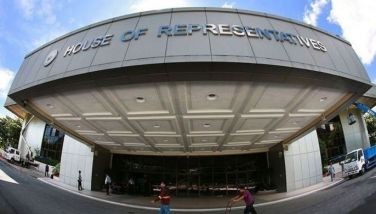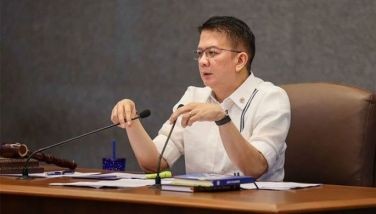Terrorist threat heightens sense of national insecurity
December 25, 2002 | 12:00am
At no other time since World War II did Filipinos feel their personal safety more imperiled even in places where they ordinarily felt safe – malls, churches, buses and other public places – than in 2002.
All because of terrorism, which in one way or another, has changed the way we live.
The new global threat was felt as early as January when over 1,000 US troops arrived for the annual "Balikatan" joint exercises with Philippine troops.
But unlike previous war games in which troops practiced fighting a conventional war, this time, the focus was combating terrorism – an enemy that could not be readily seen and could strike almost anywhere at anyone.
In its fourth quarter survey released on Dec. 16, veteran pollster Social Weather Stations said certain findings in the poll "point to serious public anxiety about terrorism, both in the Philippines and the world ... a key factor behind the decline in the President’s (approval) rating."
Another survey outfit, Pulse Asia, said in its second quarter poll that 66 percent of Filipinos aired serious concerns on public safety and terrorism.
Orlando Mercado, who chaired the Senate committee on defense and national security before he was appointed defense secretary by President Joseph Estrada, said the Sept. 11 terrorist attacks jolted people from complacency.
"Sept. 11 changed everything. People feel that there is no safe sanctuary anymore," he said. "But I think this is true not only for the Philippines but for other neighboring countries as well."
Almost a third of the US troops participating in the joint exercises, which ran for six months, were deployed in Basilan and Zamboanga City in the south.
Ill-equipped Filipino soldiers were trained on how to better fight the al-Qaeda-linked Abu Sayyaf, considered a terrorist group by Washington.
Because of the constitutional prohibition on foreign troops fighting on local soil, US soldiers were barred from joining the hunt for the bandits.
However, the rules – depending on how they were interpreted – put some of them closer to the frontlines anyway.
The legal stretch later put the nationalist Vice President Teofisto Guingona Jr. at odds with President Arroyo – a staunch supporter of the US-led global war on terrorism.
Guingona quit his second post of foreign affairs secretary in July after publicly disagreeing with Mrs. Arroyo over the US troop deployment, which Guingona said violated the Constitution.
The war games resulted in the rescue of American hostage Gracia Burnham on June 7 near the town of Sibuco in Zamboanga del Norte province. Her missionary husband Martin and a Filipina nurse, Edibora Yap were killed, however.
Two weeks later, the military launched another operation off the coast of Sibuco and killed the swaggering Abu Sayyaf spokesman Aldam Tilao, better known by his nom de guerre Abu Sabaya.
US forces provided the intelligence information that led Philippine troops to Sabaya.
But Sabaya’s body fell into the water and was never found, according to the military, triggering speculations that he got away.
Philippine and US military officials declared the joint exercises a success.
But the following month, on Aug. 20, six Jehovah’s Witness Christian evangelists – four women and two men – were abducted in Sulu by a local Abu Sayyaf faction.
The men were beheaded and their heads were put in ice boxes and left in a Patikul public market. It was a reminder that the Abu Sayyaf and their offshoot groups still remained a threat.
The bandits are also currently holding hostage three Indonesian tugboat crewmen who were seized in the waters near Basilan in June. Troops have yet to pinpoint the whereabouts of the seven hostages.
The terrorist threat peaked in October when a string of bomb attacks, mostly in Zamboanga City, killed at least 20 people – including a US soldier – and wounded over 200.
The attacks prompted authorities to tighten security across the country with security checks at malls, train and bus terminals, airports, ports, offices and other public places.
However, the stepped up security was not enough for the Australian, Canadian and European Union embassies, which closed on Nov. 8, citing "credible" terrorist threats, taking the government by surprise.
Authorities blamed the Abu Sayyaf and several group members were arrested for the bomb attacks, some of them allegedly caught in the act of making bombs.
But security forces also began searching for a new enemy that gave the fight against terrorism a global dimension – Jemaah Islamiyah.
Based in Indonesia, Jemaah Islamiyah is allegedly al-Qaeda’s regional ally and is believed to have taught the Abu Sayyaf as well as the Moro Islamic Liberation Front secessionist rebels how to make bombs.
Earlier this year, Philippine courts jailed two Indonesians, who are allegedly members of Jemaah Islamiyah, for illegal possession of explosives.
In August, the Arroyo administration’s anti-terrorism campaign was expanded to include communist rebels when the United States declared the Communist Party of the Philippines and its armed wing, the New People’s Army, as terrorist organizations. The European Union later followed suit.
The rebels protested the terrorist tag, saying they were a legitimate revolutionary movement.
After focusing on the Abu Sayyaf, Mrs. Arroyo ordered an intensified military campaign against the communists and the rebels responded with stepped up attacks on troops, police stations and mobile phone transmitting facilities, among others in remote areas.
Defense relations between the Philippines and the United States improved significantly since the Sept. 11 attacks, which were further cemented by a military logistics agreement signed on Nov. 21.
More joint anti-terrorist exercises between Philippine and US forces are scheduled next year. But in the secret war against terrorism, victory can only be certain once people start living normal lives again.
All because of terrorism, which in one way or another, has changed the way we live.
The new global threat was felt as early as January when over 1,000 US troops arrived for the annual "Balikatan" joint exercises with Philippine troops.
But unlike previous war games in which troops practiced fighting a conventional war, this time, the focus was combating terrorism – an enemy that could not be readily seen and could strike almost anywhere at anyone.
In its fourth quarter survey released on Dec. 16, veteran pollster Social Weather Stations said certain findings in the poll "point to serious public anxiety about terrorism, both in the Philippines and the world ... a key factor behind the decline in the President’s (approval) rating."
Another survey outfit, Pulse Asia, said in its second quarter poll that 66 percent of Filipinos aired serious concerns on public safety and terrorism.
Orlando Mercado, who chaired the Senate committee on defense and national security before he was appointed defense secretary by President Joseph Estrada, said the Sept. 11 terrorist attacks jolted people from complacency.
"Sept. 11 changed everything. People feel that there is no safe sanctuary anymore," he said. "But I think this is true not only for the Philippines but for other neighboring countries as well."
Almost a third of the US troops participating in the joint exercises, which ran for six months, were deployed in Basilan and Zamboanga City in the south.
Ill-equipped Filipino soldiers were trained on how to better fight the al-Qaeda-linked Abu Sayyaf, considered a terrorist group by Washington.
Because of the constitutional prohibition on foreign troops fighting on local soil, US soldiers were barred from joining the hunt for the bandits.
However, the rules – depending on how they were interpreted – put some of them closer to the frontlines anyway.
The legal stretch later put the nationalist Vice President Teofisto Guingona Jr. at odds with President Arroyo – a staunch supporter of the US-led global war on terrorism.
Guingona quit his second post of foreign affairs secretary in July after publicly disagreeing with Mrs. Arroyo over the US troop deployment, which Guingona said violated the Constitution.
The war games resulted in the rescue of American hostage Gracia Burnham on June 7 near the town of Sibuco in Zamboanga del Norte province. Her missionary husband Martin and a Filipina nurse, Edibora Yap were killed, however.
Two weeks later, the military launched another operation off the coast of Sibuco and killed the swaggering Abu Sayyaf spokesman Aldam Tilao, better known by his nom de guerre Abu Sabaya.
US forces provided the intelligence information that led Philippine troops to Sabaya.
But Sabaya’s body fell into the water and was never found, according to the military, triggering speculations that he got away.
Philippine and US military officials declared the joint exercises a success.
But the following month, on Aug. 20, six Jehovah’s Witness Christian evangelists – four women and two men – were abducted in Sulu by a local Abu Sayyaf faction.
The men were beheaded and their heads were put in ice boxes and left in a Patikul public market. It was a reminder that the Abu Sayyaf and their offshoot groups still remained a threat.
The bandits are also currently holding hostage three Indonesian tugboat crewmen who were seized in the waters near Basilan in June. Troops have yet to pinpoint the whereabouts of the seven hostages.
The terrorist threat peaked in October when a string of bomb attacks, mostly in Zamboanga City, killed at least 20 people – including a US soldier – and wounded over 200.
The attacks prompted authorities to tighten security across the country with security checks at malls, train and bus terminals, airports, ports, offices and other public places.
However, the stepped up security was not enough for the Australian, Canadian and European Union embassies, which closed on Nov. 8, citing "credible" terrorist threats, taking the government by surprise.
Authorities blamed the Abu Sayyaf and several group members were arrested for the bomb attacks, some of them allegedly caught in the act of making bombs.
But security forces also began searching for a new enemy that gave the fight against terrorism a global dimension – Jemaah Islamiyah.
Based in Indonesia, Jemaah Islamiyah is allegedly al-Qaeda’s regional ally and is believed to have taught the Abu Sayyaf as well as the Moro Islamic Liberation Front secessionist rebels how to make bombs.
Earlier this year, Philippine courts jailed two Indonesians, who are allegedly members of Jemaah Islamiyah, for illegal possession of explosives.
In August, the Arroyo administration’s anti-terrorism campaign was expanded to include communist rebels when the United States declared the Communist Party of the Philippines and its armed wing, the New People’s Army, as terrorist organizations. The European Union later followed suit.
The rebels protested the terrorist tag, saying they were a legitimate revolutionary movement.
After focusing on the Abu Sayyaf, Mrs. Arroyo ordered an intensified military campaign against the communists and the rebels responded with stepped up attacks on troops, police stations and mobile phone transmitting facilities, among others in remote areas.
Defense relations between the Philippines and the United States improved significantly since the Sept. 11 attacks, which were further cemented by a military logistics agreement signed on Nov. 21.
More joint anti-terrorist exercises between Philippine and US forces are scheduled next year. But in the secret war against terrorism, victory can only be certain once people start living normal lives again.
BrandSpace Articles
<
>
- Latest
- Trending
Trending
Latest
Trending
Latest
Recommended
































